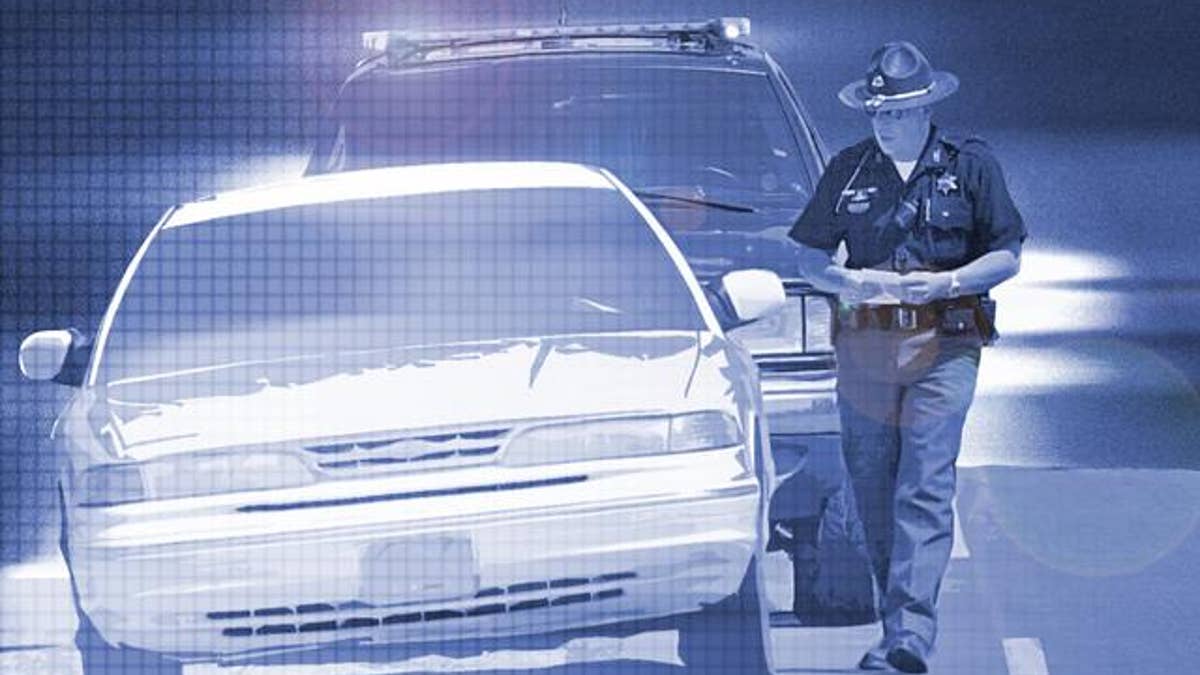
Partial graphic of a police officer stopping driver for speeding. (AP)
South Carolina is considering a bill that would allow police to slap $150 tickets on motorists caught driving less than 10 mph over the limit --10 times the current minimum -- but let them skip reporting the tickets to shield low-speed offenders from higher insurance premiums.
According to the bipartisan legislation, windfall revenues would be split between the state and the towns or cities that issue tickets.
It's not clear how much money the proposal, which was introduced last month and is now under review in a legislative committee, would raise. South Carolina faces a $800 million-plus budget shortfall.
But state Rep. Todd Rutherford, a Democratic co-sponsor of the bill, told FoxNews.com that the legislation isn't aimed at closing the deficit. While the local ticketing process would help divert revenues from insurance companies to the cash-strapped state, Rutherford said it's directed at providing additional protections for motorists.
"My biggest thing is motorists should have an option and law enforcement should have an option," he said.
Under current South Carolina law, low-level speeders are fined anywhere from $15 to $25 and all traffic tickets are required to be reported to the state Department of Motor Vehicles where points are assessed according to the law.
Insurers say the targeted ticketing won't make much difference for motorists since they no longer determine insurance costs according to a violator's rate of speed. These days, insurers look at a wide range of factors when determining premiums.
"Driving points do count, but they're not the immediate rate-raisers that they used to be," Alicia Jackson, operations manager for S.C. Insurance News Service, an insurance industry trade group, told FoxNews.com.
Rutherford said that is "partially" true because premiums are determined by violations on a motorist's record, regardless of what the violation is. So not listing violations means reduced insurance rates for motorists.
At the same time, he said he thinks most motorists would be willing to fork over $150 under the new scenario.
"If it doesn't get reported, most people don't mind paying," he said.
Rutherford said he's also not concerned by worries that the bill could bring back the days when police pocketed the fines or municipalities withheld the state's share.
"They can't do that in South Carolina," he said, explaining that over the last 10 years, only one or two troopers have been caught pocketing fines. "The ones caught were taking it from illegals because they thought they wouldn't report it."
He added that most motorists don't carry much cash on them so they wouldn't hand the fine directly over to police.
Several of the state's 46 counties already have laws on the books that create careless-driving tickets as alternatives to a statewide traffic violation, reported The State newspaper, which detailed the legislative debate. The state law would apply across the state's 270 municipalities.
Careless-driving laws began to rise in popularity with towns and cities in the early 1980s and even more so in the mid-1990s when the state began tacking on several new fees to pay for a slew of programs related to public safety and the criminal justice system, the newspaper reported.
"It was both an attempt to dodge insurance points and to dodge the court fees imposed by the state," Howard Duvall, the former longtime director of the Municipal Association of South Carolina, told the newspaper.




